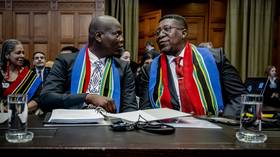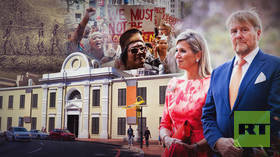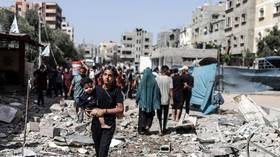Africa’s oldest liberation movement must choose left or right
Negotiations between ANC and its rivals are taking place after no party achieved a majority in the country’s recent national elections
The African National Congress (ANC), the political movement once led by Nelson Mandela, finds itself in a prickly position after South Africa’s May elections, as it seeks to negotiate a coalition with other parties to form a majority government.
The ANC, Africa’s oldest liberation movement, formed in 1912, had previously won all of the country’s six elections with a clear majority, allowing it to dominate parliament and appoint its members to head up critical ministries.
The country went to the polls on May 29 and the results were shattering for the ANC, as it obtained only 40.18% of the vote, or 159 seats in the 400-seat parliament.
Hamstrung by corruption allegations, unstable electricity and water supplies, growing unemployment and economic challenges, the ANC for the first time since it was swept into power in 1994, lost its majority.
When the election results were announced on June 2 by the Electoral Commission of South Africa (IEC), the party currently led by President Cyril Ramaphosa had lost 16% of the seats it held after the last election in 2019.
There was an almost immediate discussion on coalitions, with the ANC’s options ranging from centre-right parties like the Democratic Alliance (DA) and the Inkatha Freedom Party (IFP) to left-leaning organisations like the Economic Freedom Fighters (EFF) and the party led by former ANC president Jacob Zuma, the Umkhonto We Sizwe Party (MKP).
Where it went wrong
When Nelson Mandela was released after serving 27 years as a political prisoner of the Apartheid minority government in February 1990, he rode a wave of optimism, and as ANC president secured 62.6% of the vote in the first democratic election in 1994.
In 1999 and 2004, under President Thabo Mbeki, the ANC secured its grip on the parliamentary majority, achieving 66.35% and 69% of the vote respectively.
Since 2004 the party has been in an electoral decline, with a 2019 result of 57.5%.
The corruption allegations that plague the ANC came to the fore in 2018 at Chief Justice Raymond Zondo’s inquiry into ‘state capture’ – which conducted formal hearings for more than 400 days, during which over 300 witnesses testified. The official record of the hearings comprises over 75 000 pages, and details allegations of corruption against the party’s members, including former President Jacob Zuma, who served as president between 2009 and 2018, before he was asked to resign by his party.
Large sectors of the population have also blamed the ANC for what is termed ‘load shedding’, an unstable supply of electricity that has decimated business and investment confidence, and is largely attributed to the unemployment rate of 32.9%.
South Africa’s gross domestic product (GDP) at the end of 2023 was R6.97 trillion ($401 billion) but it is estimated that the country lost R1.5 trillion ($80.6 billion) through corruption between 2014 and 2019 while ‘load shedding’ has been estimated to have cost the economy R270 billion ($14.5 billion) between 2007 and 2023.
While all these factors played a role in the ANC’s electoral decline, the announcement by Zuma last December that he would not campaign for the ANC in the 2024 election, and would vote for a new party, would prove seismic.
Instead, he said he would campaign and vote for the newly formed MKP.
Zuma’s announcement highlighted the growing divisions within the ANC ahead of the vote, and he made no bones about his disdain for the current president and leader of the ANC, Ramaphosa.
“I have decided that I cannot and will not campaign for the ANC of Ramaphosa in 2024. My conscience will not allow me to lie to the people of South Africa,” Zuma said.
The MKP, was formed in June last year, obtained 14.58% of the vote or more than 4.5 million ballots in May, making it the third largest party in the country.
This was critical to the fortunes of the ANC as many of those who supported the MKP are believed to have been ANC supporters who became disillusioned with the policies and infighting within the governing party.
In KwaZulu-Natal, Zuma’s home province, the MKP swept aside the ANC with 45.35% of the vote compared to 17%.
This was staggering as the ANC obtained 54% of the vote in 2019 – when the MKP did not even exist – an electoral decline of 37% in an economic hub that was once a stronghold of the governing party.
A shift to the right?
The ANC for the first time finds itself unable to hold on to a majority that it had maintained since 1994, forcing it into a coalition with rival parties.
The Democratic Alliance (DA) which secured its position as opposition party in the country at the elections with 21% or 6.9 million votes has struggled to shake off the image that it represents the interests of white South Africans – something its leaders have rejected – who make up 7% of the country’s population.
After the announcement of the election results, some business sentiment indicated their preference for an ANC-DA coalition, saying this would stabilise the markets and ease the concerns of business and investors.
The DA has controlled the Western Cape province since 2009, and that region’s economy has done better than the rest of the country, even showing the results of employment creation, while the rest of the country is in a decline.
However, the ANC is mindful of alienating its support base ahead of regional elections in 2026, amid concerns over the DA opposition to progressive policies like Black Economic Empowerment (designed to enhance the economic participation of black people in the economy) or the National Health Insurance (NHI) Bill, which is intended to offer universal healthcare to the majority of the population.
Another concern to emerge from the citizenry is whether a coalition government will be able to work at the national level, given that such efforts have failed in different regions of the country.
The Inkatha Freedom Party (IFP), whose supporters were engaged in deadly clashes with the ANC in KwaZulu-Natal in the 1990s, is also being considered as a coalition partner, although both sets of supporters are wary of cooperate with such a bitter political rival just 30 years after thousands of lives were lost in inter-party violence.
Damien du Preez, an expert in participatory democracy at Stellenbosch University, told RT that people are uncertain about the concept of coalition politics.
“There’s probably quite a bit of hesitancy because those few coalitions we have had (at a regional level) have not gone well.
“They’ve been very tense and antagonistic, and they have often failed. So, I think there’s also some hesitancy to step forward into this new era.”
Du Preez said coalition discussions at the national level were uncharted territory, and that many people may not appreciate ‘the complexity of what’s going on right now’.
“Most South Africans just simply do not have the time to pay that much attention to politics, particularly given that for the past decade that they have been consistently dissatisfied with governance.
“There is a fair bit of confusion when it comes to this idea of a government of national unity, how it’s going to work, what it’s going to be like, how it’s going to be different from the previous dispensation and the previous structure of the parliament,” Du Preez told RT.
And who’s there on the left side?
As the ANC met in June to discuss coalition partners, some of its members held a picket outside the building where the meeting was taking place, against a coalition with the DA.
Former health minister Zweli Mkhize, a member of the ANC’s highest decision-making body, the National Executive Committee, in a column published on a South African news site on the subject of coalitions, said an agreement with the DA would not be in the interest of the country or serve the objective of realising all elements of the Constitution.
“The DA has opposed many policies to strengthen transformation, such as rebuilding of state-owned enterprises and improving their efficiency to support the developmental agenda. The DA favours the wholesale auctioning of these national assets to the private sector and further opposes policies aimed to ensure equality, such as National Health Insurance,” Mkhize wrote.
A coalition with the Umkhonto We Sizwe Party (MK), whose policies mimic the ANC’s, may seem more palatable to some of the governing party’s supporters, but Zuma has indicated that he will not hold a party-to-party discussion if it involves Ramaphosa.
The ANC responded by saying Ramaphosa is the party’s leader, and it will not entertain any discussions that exclude him from the negotiations.
The Economic Freedom Fighters (EFF), led by Julius Malema, is more aggressive in its left aligned-policies on transforming the economy, especially its views on nationalising mines and banks and seizing state-owned land for redistribution to black farmers, which could make the economy jittery.
Ramaphosa has indicated that instead of partnering with one or two parties that could alienate his voters or affect business confidence, there should be a power sharing arrangement or a government of national unity which would include several parties – but ANC internal documents label such an option as a highly unstable alliance unlikely to last long.
Political analyst Professor John Molepo from the North-West University told RT that the ANC finds itself in a serious predicament.
“The issue of a coalition or a government of national unity means they have to work with other political parties and depending who they partner with, they can expect a backlash from their members, particularly policy agenda and ideological issues.”
Molepo said the internal strife the party had already experienced would not make for easy coalition discussions, and there was a belief that the current leadership of the party had failed.
“The ANC needs to ask itself what went wrong and do they have the leaders who can move the party forward,” Molepo told RT.








Comments are closed.